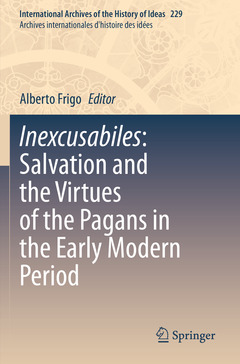Inexcusabiles: Salvation and the Virtues of the Pagans in the Early Modern Period, 1st ed. 2020 International Archives of the History of Ideas Archives internationales d'histoire des idées Series, Vol. 229
Coordonnateur : Frigo Alberto

This thought provoking book deals with religious scholarship and important controversies of the early modern period, specifically those relating to the question of the salvation of the pagans and the afterlife. From the Reformation, through the Renaissance and on to the seventeenth and eighteenth century, this was a time when religious scholarship was updated with the discoveries of the New World and colonial expansion. These chapters present new work, shedding light on the interplay of philosophy and theology in key thinkers such as Montaigne, Leibniz, Bayle and Spinoza, but also in less known authors such as Gianfrancesco Pico della Mirandola and Sebastian Castellio.
Readers will discover analysis of the reshaping of specific theological issues, focussing on the reception of ancient philosophical traditions such as Platonism, Aristotelianism, Stoicism, Epicureanism, and scepticism. The authors investigate the relationship between the ethical models inspired by the heroes and philosophers of antiquity and the ?new philosophy?. Above all, this book enables exploration of the ways in which discussions of the salvation and virtues of pagans intersected with the early modern reception of ancient philosophy, including a reassessment of the question of the moral status of unbelievers in the early modern period.
Students and faculty working on early modern intellectual history will find that this book both inspires and enriches their knowledge. Those with an interest in Renaissance humanism, the history of early modern philosophy and science, in theology, or the history of religion will also appreciate the new contributions that it makes.
1. Introduction.- Part 1. The Humanist Background.- 2. Montaigne’s Gods.- 3. The Virtues of the Pagans between Prophecy and Rhetoric in the Work of Gianfrancesco Pico della Mirandola.- 4. Frenzied Sibyls and Most Venerable Prophets: Sebastian Castellio’s Struggle with the Biblical Canon and The Response within the Reformation Camp.- Part II. The Theological Debate.- 5. The Problem of the Pagans and the Number of Elect.- 6. Gentiles in Court. From Superficial Idolatry to Implicit Faith: The Unveiling of Grace and Salvation in the Works of Paschal Rapine de Sainte–Marie (1655–1659).- 7. Beatitude and the Scope of Grace: Early Modern Morals and the Paradoxes of Felicity.- Part III. The Philosophers and the Unbelievers.- 8. Bayle and the Question of the Salvation of the Infidels.- 9. The Virtue of the Pagans and the Salvation of the Infidels in the Works of Fénelon.- 10. ‘I Don’t Know Why We Take so Much Pleasure in Thinking that People are Damned’: Leibniz and the Question of the Salvation of Pagans.- Part IV. The New Pagans.- 11. The Truth of the Matter: Observations on Inclusivism and Exclusivism.- 12. Jesuits and Chinese Atheism: Back and Forth between Europe and China.
Alberto Frigo is assistant professor of History of Modern Philosophy at the Università degli Studi of Milan. His research interest is primarily in the relationship between metaphysics and theology in the early modern times. He has published an edition and Italian translation of the correspondence of Montaigne (Le Monnier, 2010) and he is finalizing an edition of Raymond Sebond’s Theologia naturalis and its French translation by Montaigne (Garnier, 2 vols). He is the author of a readers’ guide to Pascal’s Pensées (L’Évidence du Dieu caché: introduction à la lecture des Pensées de Pascal, Presses Universitaires de Rouen et du Havre, 2015, 20163) and a monograph on Pascal’s philosophy of love (L’Esprit du corps: la doctrine pascalienne de l’amour, Vrin, 2016).
Reveals fundamental trends in the interrelated fields of early modern philosophy, theology and politics
Reassess the question of the moral status of unbelievers in the early modern period
Explores early modern controversies and the theological debate on pagan salvation
Date de parution : 03-2021
Ouvrage de 234 p.
15.5x23.5 cm
Date de parution : 03-2020
Ouvrage de 234 p.
15.5x23.5 cm
Thème d’Inexcusabiles: Salvation and the Virtues of the Pagans... :
Mots-clés :
Afterlife; Montaigne’s Gods; Pagan Sources; Pico della Mirandola; Frenzied Sibyls; Venerable Prophets; Sebastian Castellio; Biblical Canon; Tommaso Campanella’s Advancement of Learning; Pagan Salvation; Pagan Virtues; Collius and La Mothe Le Vayer; Metaphysico-Moral Paradoxes of Divine Assistance; Moral Philosophy; Hobbes’s Covenant; Pagan Monotheism; Fénelon; Jesuits and Chinese Atheism



